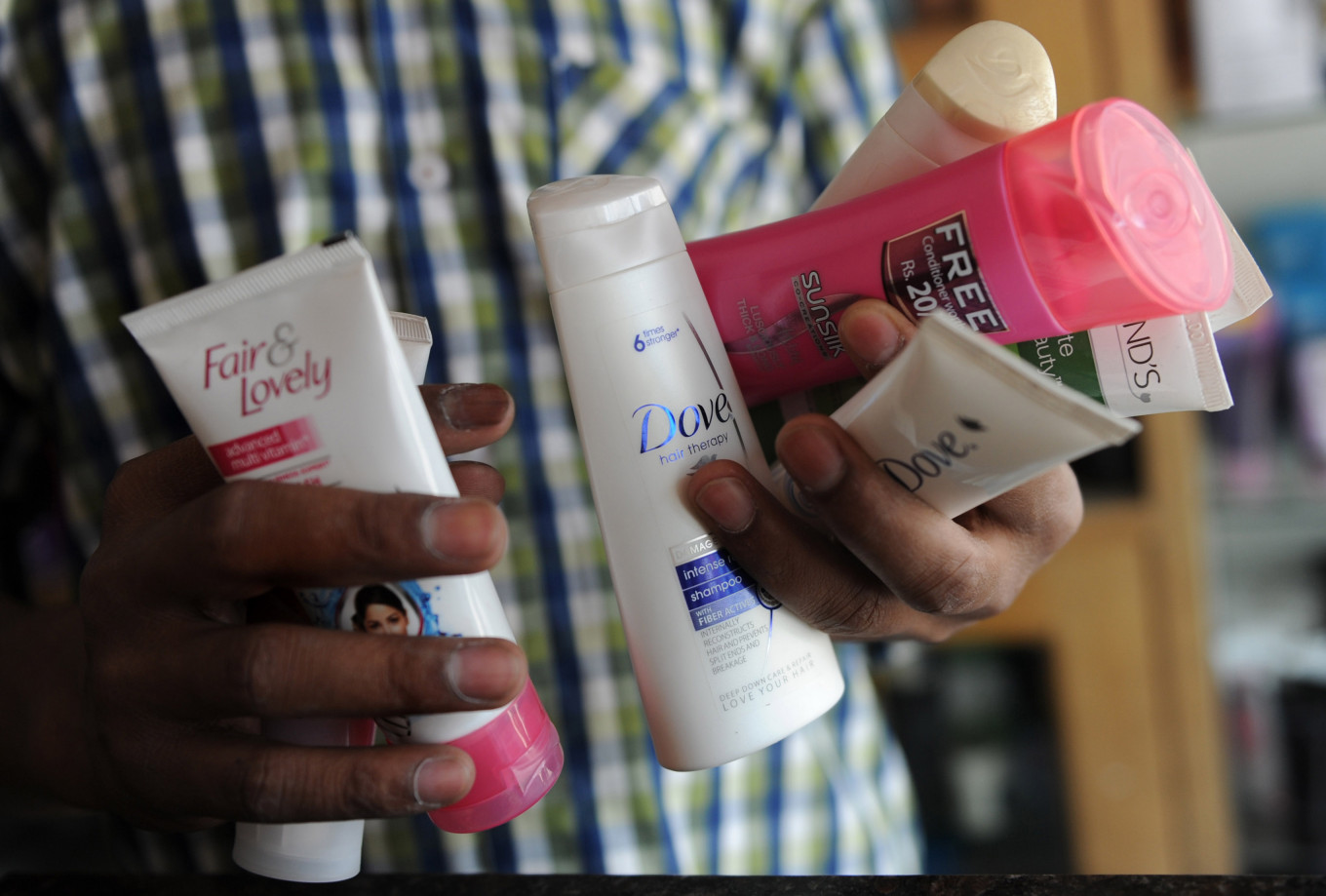Popular Reads
Top Results
Can't find what you're looking for?
View all search resultsPopular Reads
Top Results
Can't find what you're looking for?
View all search resultsUnilever Indonesia builds on ‘recession-proof’ product portfolio amid weak demand
President director Hemant Bakshi said the company had seen consumers either purchasing less of particular products or “downtrading” to less expensive options.
Change text size
Gift Premium Articles
to Anyone
C
onsumer goods giant PT Unilever Indonesia is seeking to anticipate a sustained decrease in consumption by introducing less expensive products and innovating to accommodate the shift in consumer demand.
President director Hemant Bakshi said the company had seen consumers either purchasing less of particular products or “downtrading” to less expensive options. The company expected the trend to continue during and after the pandemic.
“We have taken a variety of actions to make sure our portfolio is recession-proof because the chances that we will see downtrading and recession in the future are very high,” Bakshi said during a virtual public meeting on Tuesday.
Indonesia’s gross domestic product (GDP) contracted by 5.32 percent in the second quarter as a result of plunging consumption and investment. The government and economists expect another contraction in the third quarter, albeit to a lesser extent, bringing the country into its first recession since 1998.
Millions have lost their jobs or have seen their income decline as the pandemic grips the country. A Bank Indonesia (BI) survey found that the consumer confidence index had weakened to 83.4 in September, down from 86.9 a month earlier. A figure below 100 reflects pessimism.
Recently, Unilever introduced less expensive product alternatives and smaller quantities of its existing products, including a smaller pack of Lifebuoy Liquid Soap and soy sauce Bango, among other products rolled out to cater changing demand.
“Across the board, we will see people either consuming less or trying to consume products that may not be as expensive,” Bakshi said. “I think that is something that we will see; it is already happening and will continue.”
According to a consumer survey conducted by McKinsey & Company in June, Indonesian consumers remain cautious about spending during the pandemic. Eighty-three percent of respondents answered that they strongly agreed or agreed with the statement: “Given the economy and my personal finances, I have to be very careful about how I spend my money.”
“There has been a major change in which [demand for] health and hygiene products increased rapidly, along with cooking and at-home-consumption products. But there are also products seeing decreasing [demand],” Unilever Indonesia director Arif Hudaya said during the event on Tuesday.
Arif said that while demand in the skin cleansing, home hygiene and savory product categories had increased, demand for ice cream, deodorant, skincare products and catering supplier Unilever Foods Solution had fallen. Demand for fabric solutions, oral care products, hair care products and beverages remained constant.
This year, Unilever Indonesia launched Lifebuoy Hand Sanitizer, Wipol Wipes, Wipol Disinfectant Spray and Rinso Laundry Disinfectant in response to increased demand for hygiene products during the pandemic.
Arif noted that while the company continued to pursue product innovation, it had been “very selective” in choosing its products. Usually, he said, the company spent 2 to 2.5 percent of its sales on capital expenditure (capex). That allocation had declined to 1 percent during the pandemic.
“Under these circumstances, we make sure that 1 percent is the limit and is given to the products that are growing rapidly in this crisis,” Arif said.
During the first nine months of the year, Unilever Indonesia recorded a 1.29 percent year-on-year (yoy) drop in net profit to Rp 5.44 trillion (US$373.55 million), while its sales grew 0.3 percent yoy to Rp 32.46 trillion during the same period.
Mirae Asset Sekuritas Indonesia analyst Mimi Halimin expected the company to recover somewhat in the fourth quarter, despite the recovery not being as strong as previously thought because of a downward revision of sales estimates for food and refreshments.
Mimi noted that the company’s net profit could decline by 0.8 percent yoy to Rp 7.3 trillion by the end of this year, while the estimate for next year’s net profit stood at Rp 7.8 trillion, around a 7 percent yoy increase from 2020’s net profit estimate.
“We believe that the outlook for next year will be better,” she said.
The company’s shares, traded on the Indonesia Stock Exchange (IDX) under the stock symbol UNVR, were up 0.96 percent from the previous trading day as of 1:15 p.m. Jakarta time on Tuesday. Meanwhile, the benchmark Jakarta Composite Index (JCI) was up 0.13 percent.
This year, the company’s shares have lost almost 6 percent of their value, outperforming the JCI’s year-to-date loss of 18 percent.










